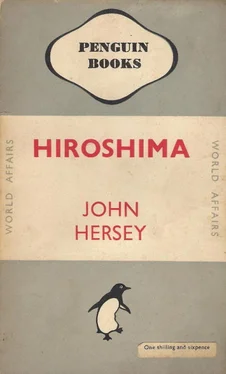John Hersey - Hiroshima
Здесь есть возможность читать онлайн «John Hersey - Hiroshima» весь текст электронной книги совершенно бесплатно (целиком полную версию без сокращений). В некоторых случаях можно слушать аудио, скачать через торрент в формате fb2 и присутствует краткое содержание. Город: London, Год выпуска: 1946, Издательство: Penguin Books, Жанр: История, на английском языке. Описание произведения, (предисловие) а так же отзывы посетителей доступны на портале библиотеки ЛибКат.
- Название:Hiroshima
- Автор:
- Издательство:Penguin Books
- Жанр:
- Год:1946
- Город:London
- ISBN:нет данных
- Рейтинг книги:4 / 5. Голосов: 1
-
Избранное:Добавить в избранное
- Отзывы:
-
Ваша оценка:
- 80
- 1
- 2
- 3
- 4
- 5
Hiroshima: краткое содержание, описание и аннотация
Предлагаем к чтению аннотацию, описание, краткое содержание или предисловие (зависит от того, что написал сам автор книги «Hiroshima»). Если вы не нашли необходимую информацию о книге — напишите в комментариях, мы постараемся отыскать её.
Hiroshima — читать онлайн бесплатно полную книгу (весь текст) целиком
Ниже представлен текст книги, разбитый по страницам. Система сохранения места последней прочитанной страницы, позволяет с удобством читать онлайн бесплатно книгу «Hiroshima», без необходимости каждый раз заново искать на чём Вы остановились. Поставьте закладку, и сможете в любой момент перейти на страницу, на которой закончили чтение.
Интервал:
Закладка:
The Reverend Mr. Tanimoto got up at five o’clock that morning. He was alone in the parsonage, because for some time his wife had been commuting with their year-old baby to spend nights with a friend in Ushida, a suburb to the north. Of all the important cities of Japan, only two, Kyoto and Hiroshima, had not been visited in strength by B-san , or Mr. B, as the Japanese, with a mixture of respect and unhappy familiarity, called the B-29; and Mr. Tanimoto, like all his neighbours and friends, was almost sick with anxiety. He had heard uncomfortably detailed accounts of mass raids on Kure, Iwakuni, Tokuyama, and other nearby towns; he was sure Hiroshima’s turn would come soon. He had slept badly the night before, because there had been several air-raid warnings. Hiroshima had been getting such warnings almost every night for weeks, for at that time the B-29s were using Lake Biwa, northeast of Hiroshima, as a rendezvous point, and no matter what city the Americans planned to hit, the Super-fortresses streamed in over the coast near Hiroshima. The frequency of the warnings and the continued abstinence of Mr. B with respect to Hiroshima had made its citizens jittery; a rumor was going around that the Americans were saving something special for the city.
Mr. Tanimoto is a small man, quick to talk, laugh, and cry. He wears his black hair parted in the middle and rather long; the prominence of the frontal bones just above his eyebrows and the smallness of his moustache, mouth, and chin give him a strange, old-young look, boyish and yet wise, weak and yet fiery. He moves nervously and fast, but with a restraint which suggests that he is a cautious, thoughtful man. He showed, indeed, just those qualities in the uneasy days before the bomb fell. Besides having his wife spend the nights in Ushida, Mr. Tanimoto had been carrying all the portable things from his church, in the close-packed residential district called Nagaragawa, to a house that belonged to a rayon manufacturer in Koi, two miles from the centre of town. The rayon man, a Mr. Matsui, had opened his then unoccupied estate to a large number of his friends and acquaintances, so that they might evacuate whatever they wished to a safe distance from the probable target area. Mr. Tanimoto had had no difficulty in moving chairs, hymnals, Bibles, altar gear, and church records by pushcart himself, but the organ console and an upright piano required some aid. A friend of his named Matsuo had, the day before, helped him get the piano out to Koi; in return, he had promised this day to assist Mr. Matsuo in hauling out a daughter’s belongings. That is why he had risen so early.
Mr. Tanimoto cooked his own breakfast. He felt awfully tired. The effort of moving the piano the day before, a sleepless night, weeks of worry and unbalanced diet, the cares of his parish—all combined to make him feel hardly adequate to the new day’s work. There was another thing, too: Mr. Tanimoto had studied theology at Emory College, in Atlanta, Georgia; he had graduated in 1940; he spoke excellent English; he dressed in American clothes; he had corresponded with many American friends right up to the time the war began; and among a people obsessed with a fear of being spied upon—perhaps almost obsessed himself—he found himself growing increasingly uneasy. The police had questioned him several times, and just a few days before, he had heard that an influential acquaintance, a Mr. Tanaka, a retired officer of the Toyo Kisen Kaisha steamship line, an anti-Christian, a man famous in Hiroshima for his showy philanthropies and notorious for his personal tyrannies, had been telling people that Tanimoto should not be trusted. In compensation, to show himself publicly a good Japanese, Mr. Tanimoto had taken on the chairmanship of his local tonarigumi , or Neighbourhood Association, and to his other duties and concerns this position had added the business of organising air-raid defence for about twenty families.
Before six o’clock that morning, Mr. Tanimoto started for Mr. Matsuo’s house. There he found that their burden was to be a tansu , a large Japanese cabinet, full of clothing and household goods. The two men set out. The morning was perfectly clear and so warm that the day promised to be uncomfortable. A few minutes after they started, the air-raid siren went off—a minute-long blast that warned of approaching planes but indicated to the people of Hiroshima only a slight degree of danger, since it sounded every morning at this time, when an American weather plane came over. The two men pulled and pushed the handcart through the city streets. Hiroshima was a fan-shaped city, lying mostly on the six islands formed by the seven estuarial rivers that branch out from the Ota River; its main commercial and residential districts, covering about four square miles in the centre of the city, contained three-quarters of its population, which had been reduced by several evacuation programs from a wartime peak of 380,000 to about 245,000. Factories and other residential districts, or suburbs, lay compactly around the edges of the city. To the south were the docks, an airport, and the island-studded Inland Sea. A rim of mountains runs around the other three sides of the delta. Mr. Tanimoto and Mr. Matsuo took their way through the shopping centre, already full of people, and across two of the rivers to the sloping streets of Koi, and up them to the outskirts and foothills. As they started up a valley away from the tight-ranked houses, the all-clear sounded. (The Japanese radar operators, detecting only three planes, supposed that they comprised a reconnaissance.) Pushing the handcart up to the rayon man’s house was tiring, and the men, after they had manoeuvred their load into the driveway and to the front steps, paused to rest awhile. They stood with a wing of the house between them and the city. Like most homes in this part of Japan, the house consisted of a wooden frame and wooden walls supporting a heavy tile roof. Its front hall, packed with rolls of bedding and clothing, looked like a cool cave full of fat cushions. Opposite the house, to the right of the front door, there was a large, finicky rock garden. There was no sound of planes. The morning was still; the place was cool and pleasant.
Then a tremendous flash of light cut across the sky. Mr. Tanimoto has a distinct recollection that it travelled from east to west, from the city toward the hills. It seemed a sheet of sun. Both he and Mr. Matsuo reacted in terror—and both had time to react (for they were 3,500 yards, or two miles, from the centre of the explosion). Mr. Matsuo dashed up the front steps into the house and dived among the bedrolls and buried himself there. Mr. Tanimoto took four or five steps and threw himself between two big rocks in the garden. He bellied up very hard against one of them. As his face was against the stone, he did not see what happened. He felt a sudden pressure, and then splinters and pieces of board and fragments of tile fell on him. He heard no roar. (Almost no one in Hiroshima recalls hearing any noise of the bomb. But a fisherman in his sampan on the Inland Sea near Tsuzu, the man with whom Mr. Tanimoto’s mother-in-law and sister-in-law were living, saw the flash and heard a tremendous explosion; he was nearly twenty miles from Hiroshima, but the thunder was greater than when the B-29s hit Iwakuni, only five miles away.)
Читать дальшеИнтервал:
Закладка:
Похожие книги на «Hiroshima»
Представляем Вашему вниманию похожие книги на «Hiroshima» списком для выбора. Мы отобрали схожую по названию и смыслу литературу в надежде предоставить читателям больше вариантов отыскать новые, интересные, ещё непрочитанные произведения.
Обсуждение, отзывы о книге «Hiroshima» и просто собственные мнения читателей. Оставьте ваши комментарии, напишите, что Вы думаете о произведении, его смысле или главных героях. Укажите что конкретно понравилось, а что нет, и почему Вы так считаете.












